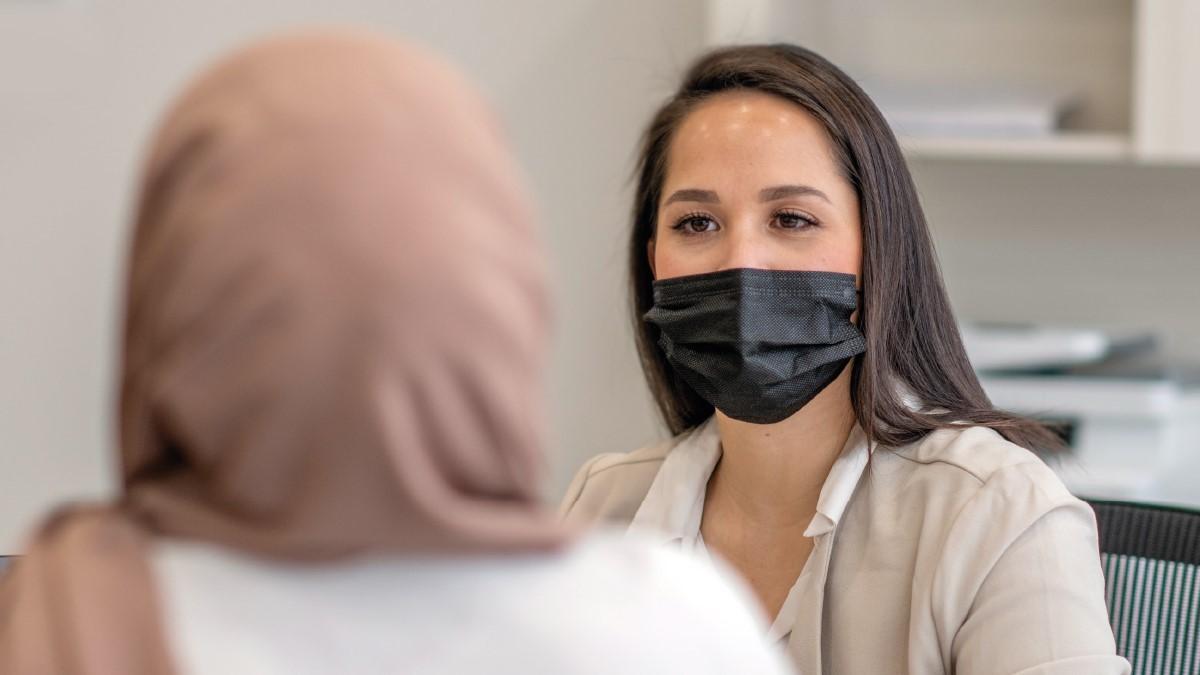As we improve our understanding of Long Covid, we all have a duty to improve our knowledge and skills, writes professional adviser Helen Harte

The past 18 months has seen us all scrabbling to learn about Long Covid. Over time, our rehabilitative approach will adapt and evolve. We need to address any gaps in knowledge and skills through continuing professional development because Long Covid will be appearing on all of our caseloads. The CSP’s Let Talk Long Covid network have been discussing this issue recently, and World Physiotherapy has produced a briefing paper titled ‘Safer rehabilitation approaches for people living with Long Covid’ which offers advice and support for clinicians.
Long Covid itself is complex, individual, unpredictable and non-linear. Managing a new illness which impacts on multiple body systems can be overwhelming. Long Covid requires us to have broader and better knowledge across the range of contemporary physiotherapy practice. To cover our gaps in knowledge we look to assessment frameworks to guide us.
But we need to start thinking differently. We need to honour the experiences of people living with Long Covid who tell us that over-assessment can be detrimental to health. It’s time to advocate for assessments based on a ‘safety-first’ approach. Just as we would screen for red flags in a person with low back pain, the same ought to be true for a person living with Long Covid and this is our professional responsibility.
What does a safe assessment look like?
Lindsay Skipper, of Long Covid Physio who has been living with the condition since spring 2020, says: ‘We need to know whether the patient has symptoms which require urgent medical attention. We need to know about Post Exertional Symptom Exacerbation (PESE) so that we don’t do too much with them. Once these ‘safety’ questions have been addressed, we have to ask ourselves “has this already been too much for our patient?”
‘Assessment shouldn’t cause symptom exacerbation. If it does, you have shown the patient that you don’t understand their situation. They will lose confidence in you and your advice. Less, sometimes, is so much more.’
So what are the ‘red flag’ questions?
One element of the Long Covid phenotype that requires careful exploration is potential organ involvement. It is recommended that people experiencing symptoms at >12 weeks post-infection are offered a chest x-ray and an ECG. Be sure to check whether these tests have been conducted, but be mindful that Long Covid is unpredictable.
Ask about signs like chest pain, shortness of breath on exertion, irregular heart rate and rhythm. Ask about signs of Dysautonomia.
If your patient uses a heart rate monitor or a smart watch, do they notice anything about their heart rate? And if the answer is yes, seek an urgent medical opinion before you proceed.
NICE recommends urgent escalation to acute services for those experiencing:
- severe hypoxaemia or oxygen desaturation on exercise.
- signs of severe lung disease.
- cardiac chest pain.
- multisystem inflammatory syndrome (in children).
Screening for Post Exertional Symptom Exacerbation
Some people living with Long Covid may go on to develop PESE. Triggers and symptoms vary from person to person.
It is neatly summarised as an atypical, excessive response to physical, cognitive or emotional exertion which:
- escalates some or all of a person’s symptoms.
- occurs immediately or up to one to three days after the triggering activity.
- results in a significant loss of functional capacity.
Critically, PESE is not made better with ‘good night’s sleep’ and the level of exacerbation is disproportionate to the trigger(s). Recovery from a PESE crash is complex and unpredictable.
It can take time, from days to months. If you suspect a person presents with PESE we recommend that you advise to STOP, REST, PACE. You must ensure you are practising within your personal scope of practice and competence.
Clinically-reasoned needs-led assessment
Clinical reasoning must be applied judiciously. If a person tells you that sitting upright causes symptoms, a one minute sit to stand test is likely to cause symptom exacerbation. If a patient finds reading or thinking tiring, endless subjective outcome measures will likely exacerbate symptoms.
Be mindful that a physiotherapy assessment represents a physical, cognitive and emotional effort for any person. The energy required to attend clinic, undergo numerous tests, answer multiple questions can be exhausting.
If we are to advocate pacing as a fundamental rehabilitation strategy for Long Covid then don’t we need to pace our assessment too?
Links
- CSP Lets Talk Long Covid network
- World Physiotherapy Briefing paper
- NICE Covid-19 rapid guideline
- CSP Covid-19 rehabilitation standards
The CSP’s Professional Advice Service gives advice and support to members on complex and specialist enquiries about physiotherapy practice.
Number of subscribers: 6
